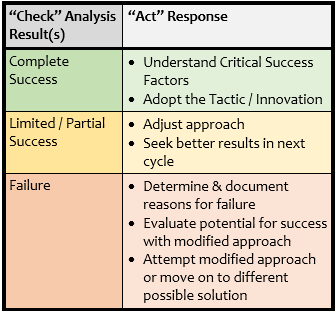When Wrong is Better than Half Right
A fundamental tenant of continuous quality improvement (CQI) methodology is the Shewhart or “PDCA” cycle developed by Walter Shewhart. The four consecutive phases in the model are:
- Plan: Recognize an opportunity and plan a change.
- Do: Test the change. Carry out a small-scale study.
- Check: Review the test, analyze the results, and identify what you’ve learned.
- Act: Take action based on what you learned in the check step.
Beyond Process: PDCA is a sequential methodology for testing and evaluating individual process changes or improvements, with applicability in other disciplines including working with Tactics in Strategic Planning. Strategic Plans, really, are all about change...developing and implementing changes that will help transform your organization or service line from the current state to a desired future state as embodied in a Vision Statement or Goals (or both). The Shewhart Cycle provides a simple, logical framework for implementing and evaluating individual Strategies and Tactics, helping us decide which ones to keep, and which ones to either modify or abandon.
Measurement in Planning: Successful Strategic Planning requires us to stay fixated on the desired future state, but somewhat flexible on the Tactics. And it turns out, measurement is critical for both. With a viable set of Vision / Goal measures, you’ll know if you’re progressing toward the desired future state, making it easier to stay fixated on it. But which tactics are helping you get there?
That’s where PDCA comes in. Treat each Tactic like a discrete mini improvement effort. Be sure to assign one or more simple but meaningful success measures to each one. Then, use an Action Plan or similar template to Plan and Do each Tactic. Don’t stop there, however, or you will only be half right. You need the rest of PDCA to know which Tactics are helping and which are not. Use Check to examine the measures and assess both what happened in the Do stage and what the impact was. Then Act...your response can be based on the results of this analysis (see sidebar).
Getting the Most Out of Tactics: PDCA gives us a framework for implementing and evaluating each Tactic...and you will need it repeatedly throughout the life of your Plan, because both the marketplace you serve and the economic sector in which you participate are always changing. As they evolve, some of your Tactics may become irrelevant. Meanwhile, you may need to add new Tactics in response to new developments or innovations.
Some Tactics may turn out to be less effective than originally thought when your Plan was developed, or fail altogether, and PDCA provides a disciplined approach for learning why. In process improvement, this allows us to build all kinds of knowledge, including types of changes that work and types that don’t, and critical implementation success factors germane to your service or product portfolio. The same is true with Tactics evaluation.
Flexibility and Learning with PDCA: It is much easier to achieve Tactical level flexibility and learn from Tactics that fail if you treat each Tactic as an experiment using PDCA. However, you need to be more than half right in applying it. If you only Plan and Do each Tactic, you won’t know which ones are helping achieve the desired future state (and should be kept), and which ones are a waste of valuable resources.
So then, in working with change, you are better off being wrong than being half right. That is to say, you are better off using the whole PDCA cycle and having been wrong about a Tactic (or a process change), and learning from it, than you are if you only Plan and Do Tactics.
Complete the Cycle...and Learn: I had a professor in graduate school who was often presented with an alternative or new idea by a student (including me), and asked, “So, do you think this would be better?” He would always reply with a smile, “Try it and see.” Notice he didn’t just say “Try it.” Hi wisdom lives on!
If you need help with Tactics, leveraging measures, or learning from failures, in Strategic Planning or any other aspect of management, contact me at your convenience.
Jeff

